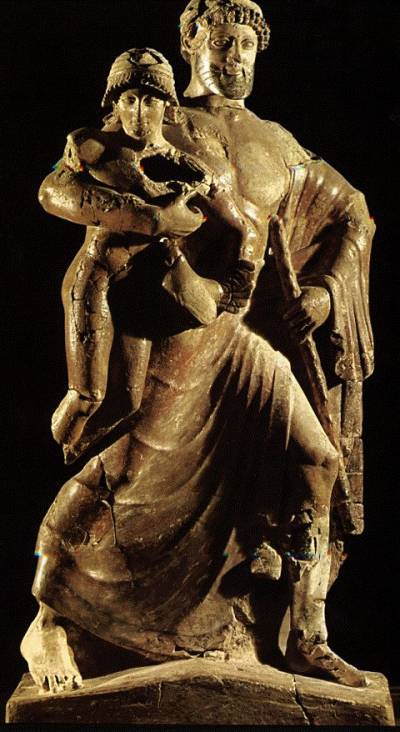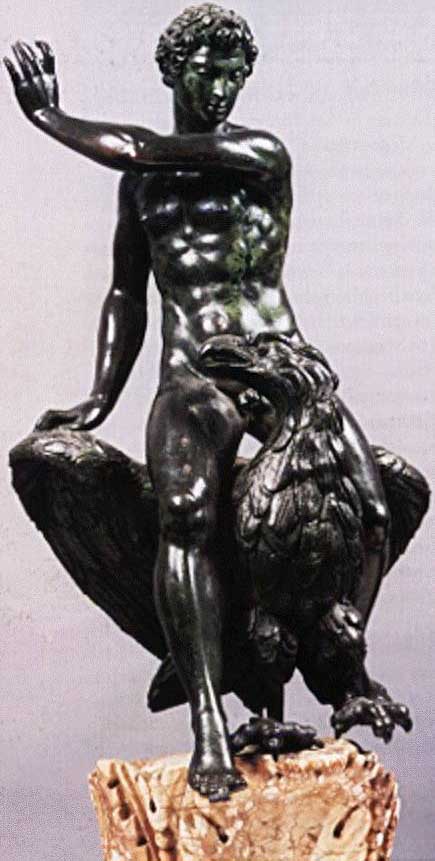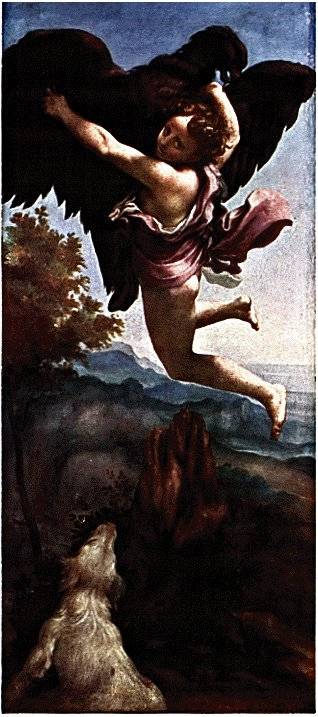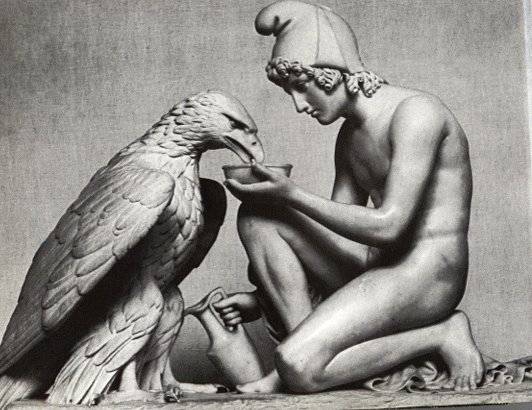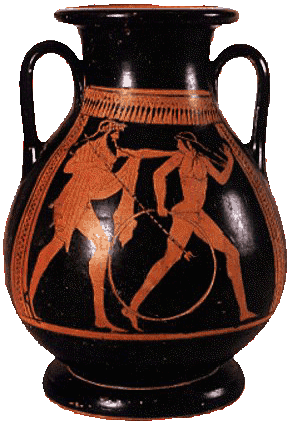|
|
|
ZEUS
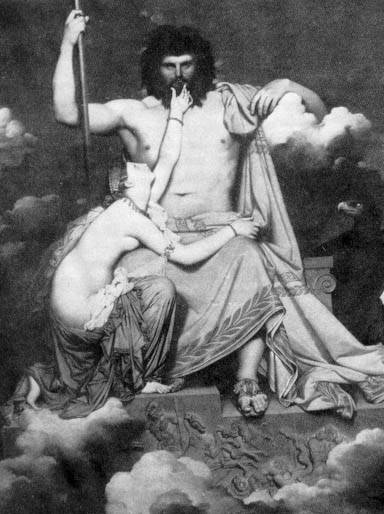
From Hesiod's Works and Days
( 1-10) Muses of Pieria who give glory through song, come
hither, tell of Zeus your father and chant his praise. Through
him mortal men are famed or un-famed, sung or unsung alike, as
great Zeus wills. For easily he makes strong, and easily he
brings the strong man low; easily he humbles the proud and raises
the obscure, and easily he straightens the crooked and blasts the
proud, -- Zeus who thunders aloft and has his dwelling most high.
Attend thou with eye and ear, and make judgments straight with
righteousness. And I, Perses, would tell of true things.

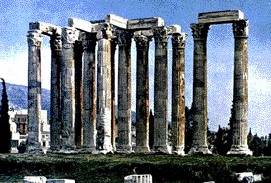

Homeric Hymn to Zeus
1-3) I will sing of Zeus, chiefest among the gods and
greatest, all-seeing, the lord of all, the fulfiller who whispers
words of wisdom to Themis as she sits leaning towards him.
(4) Be gracious, all-seeing Son of Cronos, most excellent and
great!
![]()
Origins of Zeus in History
We shall begin our talk about Zeus in history by unveiling his very homeland Crete.There he was known under another name, Velchanos. Other names of Zeus , Lord of all high things. Also called Nephelgeretes, "Cloud Gatherer". He was Zeus Cthonos, as a God of earth and fertility. He was Zeus Soter as father and savior of humanity. He was Zeus Eleuthrios as guardian of liberty. As Xenios, he was protector of the rules of hospitality. As Herkois, he was protector of the house. As Kleisos, he was guardian of property. As Gamelios, he was god of Marriage.
The Cretan people may have been brutal but they were most diffidently religious peoples. The power of their kings was based upon force, religion and law. In order to make keeping the peoples obedient the king would suborn the gods to his use; his priests explain to the people that he is descended from Velchanos, and recieved from the deity the laws that he decrees. Every nine years if he was competent and generous they reannoint him with divine authority. To administer the state there were under his employment a staff of ministers, bureaucrats and scribes. He taxes in kind, and keeps stores in giant jars his revenues of grain, wine and oil. Out of this treasury is where he gets the funding to pay his men. At the throne of the palace ( judgment seat) in the royal villa, he settles in person such litigation as has run the gauntlet of the appointed courts. So far does his reputation as a magistrate precede him, when he dies he becomes in Hades by Homer's assurance, the inescapable judge of the dead. We call him Minos, but we do not know his name. It is considered that it may have been a title like Pharaoh or Caesar and would have covered a multitude of kings.
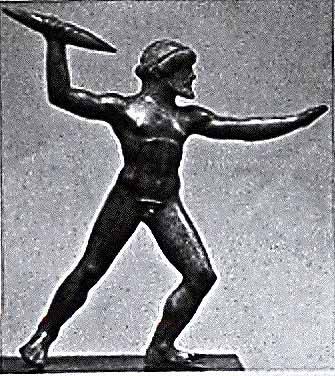
The Cretan had a rather extensive human mixture of superstition,
idealism, fetishism and reverence. He worshiped all of nature surrounding him in his caves, mountains, stones,
trees, sun, moon, stars, goats, snakes, doves, bulls, pillars and the number 3. There is hardly anything that would
escape his theology. He views the air as filled with spirits genial or devilish. In his world there was a sylvan-ethereal
population of dryads, sileni, and nymphs. They did not directly pay homage to the phallic emblem, however they
venerated with awe the generative vitality of the bull and the snake. the death rate was very high and they would
pay great respects to fertility. This is where a mother goddess with generous mammae and sublime flanks, with reptiles
creeping up the arms and breasts, coiled in her hair, or rearing themselves open her head emerged. The Cretan would
see her as the basic fact of nature - that mans greatest enemy that is death is overcome with womans mysterious
power of reproduction. This power he associated with divinity. The mother goddess represents all the forces of
life from humans and animal life and into the plant and tree kingdom. She is surrounded in her image with fauna
and flora because these were abundant with her creative fertility and therefor serve as her symbols and her emanations.
Occasionally she appears holding Velchanos, whom she has borne in a mountain cave. In this sense as a universal
truth we can feel the unity of prehistoric culture and the continuity of religious ideas and symbols in the Mediterranean
world. Not all that unlike Isis and Horus, Ishtar
and Tammuz, Cybele and Attis, Aphrodite and Adonis
which can be seen as very similar to this ancient theme.
The Cretan Zeus is a subordinate to his mother in the affections from the people. But this changes as he grows in importance. He becomes the personification of rain, and the moisture in this religion, that underlies all things. He dies, and his sepulcher is displayed from generation to generation on Mt. Iouktas, where its majestic profile may be seen still. He rises from the grave as a symbol of reviving vegetation, and the Kouretes priests would have celebrated with dances, and clashing shields. It is believed by some that in some instances as a god of fertility, he is conceived as incarnate in the sacred bull; it is as the bull that he mates with Minos' wife Pasiphae in the myth of the monstrous Minos-bull or Minotaur.
To appease their deities the Cretans used
lavish prayers and sacrifices, symbols and ceremonies were held by priestesses, and other times officials of the
state. To ward demons away the would burn incense.To attract a negligent divinity they would play music on a flute
or a lyre, and sing, in chorus, hymns of adoration. To promote the growth of the farm, they would water trees and
plants in a solemn ritual. Priestesses would shake down the ripe fruit in a nude frenzy, other times the women
in a festival procession would carry flowers and fruits for tributes for their goddess. They had no temples but
they constructed altars in the palace court, in sacred groves on mountain tops and grottoes. The sanctuaries were
adorned with tables of libation and sacrifice. There were an assortment of idols, and "horns of consecration"
They were profuse with holy symbols which they had worshiped along with the gods with whom they signify; first
their shield, (perhaps their goddess in a warrior form) then the cross - in both it's Greek and it's Roman shapes,
and as a swastika - cut upon the forehead of a bull or the thigh of a goddess, or carved upon seals, or raised
in marble in the palace of the king. Above all these the double ax, as an instrument of sacrifice magically enriched
with the virtue of the blood that it would have shed, or as a holy weapon unerringly guided by the god, or even
as a sign of Zeus the Thunderer cleaving the sky with his bolts.
Lastly they offered very modest care to their deceased. They buried them in massive jars or clay coffins, for if they were not buried they would return. To keep them content below the ground they left offerings of food, articles of toiletry, and clay figurines to comfort and console them through all of eternity. Some ancient incipient skeptics would substitute the food with clay animals. When a king or noble or wealthy trader were buried they would receive with touching sympathy a set of chess with a real good player, a clay orchestra for a musician, a boat with one whom loved the sea. From time to time they would have returned to offer more sacrificed of food or otherwise. They hoped that in some secret Elysium( Island of the Blest), the just god Rhadamanthus (son of Zeus Velchanos) will accept the purified soul, and give to them the happiness and the peace that they go without while on their earlthy quests.
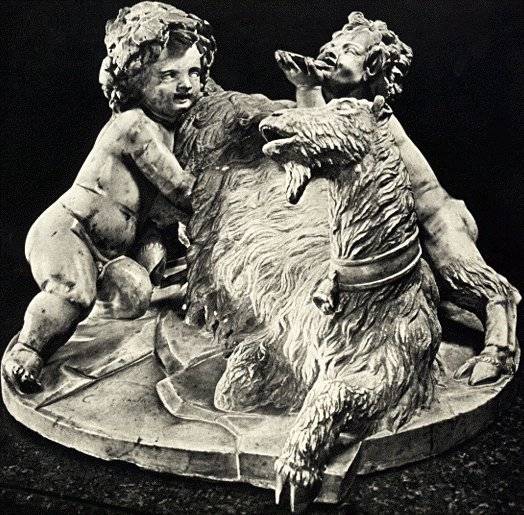
Zeus as an infant with Amalthea & Pan
The Birth of Zeus
Cronus had eaten his offspring from Rhea: Hestia, Demeter, Hera, Hades,and Poseidon. To tell this tale we give you :
Hesiod ( Theogany 453-506)
Great Cronus swallowed his children as each one came from the womb to the knees of their holy mother, with the intent that no other of the illustrious descendants of Uranus should hold kingly power among the immortals. For he learned from Ge and starry Uranus that it was fated that he be overcome by his own child. And so he kept vigilant watch and lying in wait he swallowed his children. A deep and lasting grief took hold of Rhea and when she was about to bring forth Zeus, father of gods and men, then she entreated her own parents, Ge and starry Uranus, to plan with her how she might bring forth her child in secret and how the avenging fury of her father, Uranus, and of her children whom Cronus of the crooked counsel swallowed, might exact vengeance. And they readily heard their daughter and were persuaded, and they counseled her about all that was destined to happen concerning Cronus and his stout-hearted son. And they sent her to the town of Lyctus in the rich land of Crete when she was about to bring forth the youngest of her children, great, Zeus. And vast Ge recieved him from her in wide Crete to nourish and foster. Carrying him from there Ge came first through the swift black night to Dicte. And taking him in her hands she hid him in the deep cave in the depths of the holy earth on thickly wooded Mt. Aegeum. And she wrapped up a great stone in infants coverings and gave it to the son of Uranus, who at that time was the great ruler and king of the gods. Then he took it in his hands, poor wretch, and rammed it down his belly. He did not know in his heart that there was left behind, in the stones place, his son unconquered and secure, who was soon to overcome him and drive him from power and rule among the immortals.
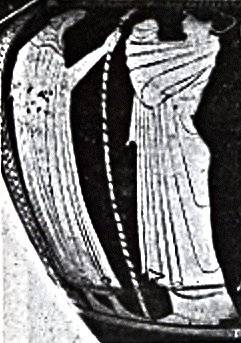
Rhea carrying rock to Cronus

![]()
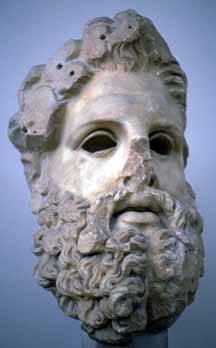
Ode to Zeus
By: Jennifer H. Wright
Hail to thee lord O' mighty Zeus
Keeper of the realms of all heavenly and divine Olympus
The great thunderer of the skies
Magnificent and wise
He whom is fair and impartial
to any of good faith whom tries.
Sacred is any space
that you have visited or where you may roam
All mighty Zeus in his unearthly throne
I pledge to thee my loyalty
and vow to thee my love
for thou art the ruler and the keeper of the key.
Hail O' great Zeus
Blessed be Zeus
Praise to you and yours and thy heavenly wife Hera
whom has had many remarkable children.
Though thou may not be the creator
Thou has blessed all worlds with many wonderful things
from which I adore and of I sing.
![]()
Zeus's Parents : Cronus and Rhea
Cronus and Rhea were deities of the sky and earth just like Uranus and Gaea, also similar is that their union represents the universal holy marriage. However the tradition of Cronus and Rhea have a more specific reality than that of their parents. Cronus is usually depicted as majestic and sorrowful, with a sickle in his hand. He ruled in the golden age among men, when he is deposed by Zeus, he retires to some distant land, thought to be designated as the Islands of the Blessed.
Rhea's mythological personality with many names as an important mother-goddess of earth and
fertility. she is sometimes equated with the Oriental goddess, Cybele.
Cybele
Here is the Homeric Hymn to the Mother of the Gods that pays tribute to Rhea and her nature.
Through me, clear-voiced Muse, daughter
of great Zeus, sing a hymn to the mother of all gods and mortals too. The din of castanets and drums, along with
the shrillness of flutes, are your delight, and also the cry of wolves, the roar of glaring lions, the echoing
mountains and the resounding forests.
So hail to you and, at the same time, all the goddesses in my song.
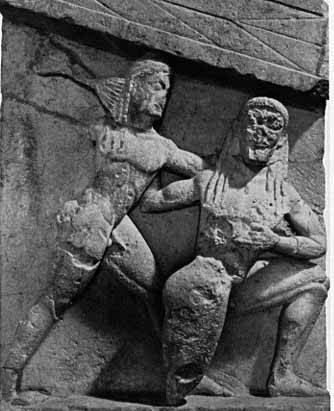
[ Zeus and his father Cronus ]

There is a myth about Typhon a foul monster created by mother
earth and
Tartarus.
His thighs downward were all coiled like serpents, and his arms could reach a
hundred leagues in any direction, he also had countless heads of serpents as
opposed to hands... His head reached the reached the stars, his large wings
darkened the sun, fire flashed from his eyes, and flaming rocks spewed from his
mouth. He was sent upon to destroy the Olympians for the revenge of what had
been done to the giants. When he came to Olympus all the gods but Athene fled to
Egypt.
They all had taken disguises of animals...
Athene then taunts Zeus for his cowardice till he comes back and draws forth a
thunderbolt towards Typhon and then proceeds to strike with the same flint sickle he had castrated his father Uranus
with.. Zeus eventually is disarmed and captured by Typhon and
is dragged to a cave where he is stood guard over by Delphyne his serpent tailed sister. However, Hermes and Pan
save him.
When Zeus returns to Olympus he mounts upon a chariot drawn by winged horses and
pursues Typhon further.. Typhon flees towards Sicily, where Zeus hurls Mt.
Aetna upon him.. it then becomes a volcanic mountain and fire still belches from
it till this day...

Zeus Attacking Typhon
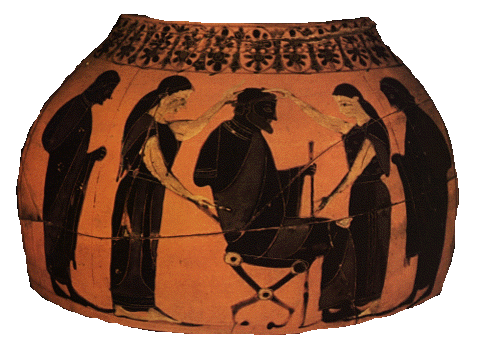
Zeus giving birth to Athene
Here is a collection of art displaying the affection and glory of Zeus with Ganymedes. According
to myth he is the fair youth honoured with the task of being the cup bearer to almighty Zeus.
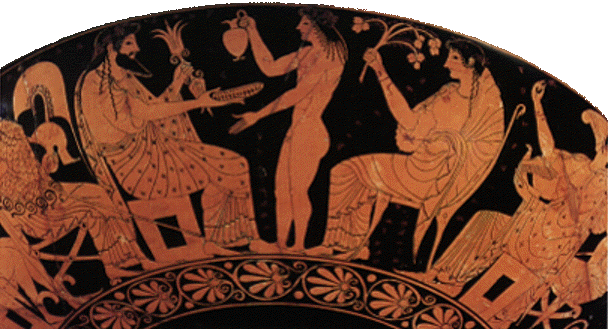
From a Homeric Hymn to Aphrodite:
( 202-217) `Verily wise Zeus carried off golden-haired
Ganymedes because of his beauty, to be amongst the Deathless Ones
and pour drink for the gods in the house of Zeus -- a wonder to
see -- honoured by all the immortals as he draws the red nectar
from the golden bowl. But grief that could not be soothed filled
the heart of Tros; for he knew not whither the heaven-sent
whirlwind had caught up his dear son, so that he mourned him
always, unceasingly, until Zeus pitied him and gave him high-
stepping horses such as carry the immortals as recompense for his
son. These he gave him as a gift. And at the command of Zeus,
the Guide, the slayer of Argus, told him all, and how his son
would be deathless and unageing, even as the gods. So when Tros
heard these tidings from Zeus, he no longer kept mourning but
rejoiced in his heart and rode joyfully with his storm-footed
horses.
